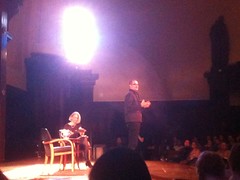In the previous two posts, I tacked the question, “Why does Jesus have to die?” (as opposed to redeem in a manner not actually requiring death). This post, I want to reflect upon how we respond to the sacrifice of Jesus and the salvation that He invites us to partake in.
In thinking of my response to Jesus, this is where we might appreciate the theology of the incarnation on a different level. It makes all the difference to me that God did not simply hover above the world and slap down a new deal or legislate one through some type of Super-Divine Congress that passes cosmic laws. By becoming human, one of us, we could identify with Him. And so when we consider sacrifice, it’s humbling to know that He understands quite personally.
In the last post, I asked, “What do you give a God that can create anything He wants?”. In this one I ask, “What do you give a God who died in our place so that the world may be forgiven and reconciled?” What do you sacrifice to this God? Bear in mind that everyone sacrifices something, it’s the “to whom” and “the what” that we differ on.
It’s tempting to think that we must present to him the type of perfection that He demonstrated. Unfortunately, our flawed nature will fail in this noble endeavor. Perhaps we could offer various types of “memorials” for His kindness. Perhaps we could spend a few moments each day thanking Him and perhaps we could assemble in a special building maybe and sing songs, offer prayers, and remind ourselves what was done – would that be enough? Unfortunately, again, religious duty, though good and noble, is not what God has asked for.
The Lord has asked His followers for their complete love. Initially, this sounds like a bargain, until we begin to understand just what complete love entails. In Mark 12:29-31, Jesus says that the greatest command is to love God with all of your heart, mind, soul and strength. Then adding that the second greatest command is to love your neighbor as yourself. Frankly, daily and weekly memorials seem much easier.
We are asked for our love because this is the greatest thing we have, not our resources, not our time, but our love. To love God completely with every fiber our of being, to love God more than we love ourselves is the greatest sacrifice that we can make. We may initially think that this takes something away from our spouses, children, parents, siblings, relatives, friends – even ourselves but we would be mistaken. It’s in offering our love to God that we learn what love is. It’s always been interesting to me that the Bible describes God as love (I Jn. 4). In discovering God, the source of love, I learn how to better love my wife, children, parents, siblings, relatives, friends, myself and as Jesus taught us, the strangers and our enemies.
It sounds wonderful and beautiful until we realize what it takes to actually be people of love. Loving in the midst of disappointment, hurt, anger and in many other contexts is a very difficult thing. Living in obedience and faithfulness to who we love is difficult. While this should deepen the beauty of the cross, it also helps to understand a little more of Paul is laying out for us as believers in Romans 12. The chapter begins with, “offer your bodies as a living sacrifice, holy and pleasing to God—this is your true and proper worship.” Among my favorite parts is how this section ends, “we must clothe ourselves in the Lord Jesus Christ today” (Rom. 13:14).
I think of sacrifice as bearing all that I am to be consumed and destroyed and I would be if it not were the person of Jesus. God being Triune, this is the mercy and goodness of God, this is the giving of the Holy Spirit, this is the work of Christ – to bring forgiveness and redemption. As I have been observing Lent this year, the idea of sacrifice being life-giving has been my theme, I hope it has been hopeful to you too. Thanks for reading.
Next week, I am planning on talking a little on how the idea of sacrifice intersects with life in places of culture that I observe. We’ll be starting with the Jersey Shore :)
 David Fitch’s post
David Fitch’s post  Let me describe the vibe of the room – it was buzzing and once again it reminded me of that line “Rob Bell is a rock star in the evangelical world”. Don’t take it out on Bell, it was similar to that when we went see NT Wright at Wheaton too and that crowd was a bit older, established, educated even, etc. Indeed the room was filled with many appreciators of Rob. I wondered beforehand how many critics were there given the firestorm but even during the Q&A, I didn’t get the sense that many had come. I thought all the questions were honest (though they may not have been great) but certainly appropriate for what everyday people are thinking like, “Will God force an atheist into heaven?” And for those wondering, the questions were selected randomly.
Let me describe the vibe of the room – it was buzzing and once again it reminded me of that line “Rob Bell is a rock star in the evangelical world”. Don’t take it out on Bell, it was similar to that when we went see NT Wright at Wheaton too and that crowd was a bit older, established, educated even, etc. Indeed the room was filled with many appreciators of Rob. I wondered beforehand how many critics were there given the firestorm but even during the Q&A, I didn’t get the sense that many had come. I thought all the questions were honest (though they may not have been great) but certainly appropriate for what everyday people are thinking like, “Will God force an atheist into heaven?” And for those wondering, the questions were selected randomly. Soon after he was asked another direct question (around the 28 minute mark) that was something to the effect of “Coming from a Jewish family, we would find it offensive for you to imply that our salvation has to come from Jesus.” I seriously wonder if anyone in evangelicalism could have had a better a Christian answer and not come across as offensive to her. It was probably my favorite moment of the night. He refereed to Moses striking the rock and providing water for the Israelites (Numbers 20) and said later, Paul describes the water from this rock as Christ (I Cor. 10). Paul does not offer much commentary there but the implication is that God has always been rescuing people. He mentions that it’s good for us to be generous when talking about such things, Jesus comes and makes the Torah speak, shows compassion, love, etc. concluding that Jesus is a paradox that we have been wrestling with for thousands of years. She seemed sincerely satisfied with that answer and frankly, I am not sure many other evangelicals could have done better in the sense of serving the asker and honoring the Lord. Some may dismiss that as tightrope walking, others may see it as a powerful and truthful moment.
Soon after he was asked another direct question (around the 28 minute mark) that was something to the effect of “Coming from a Jewish family, we would find it offensive for you to imply that our salvation has to come from Jesus.” I seriously wonder if anyone in evangelicalism could have had a better a Christian answer and not come across as offensive to her. It was probably my favorite moment of the night. He refereed to Moses striking the rock and providing water for the Israelites (Numbers 20) and said later, Paul describes the water from this rock as Christ (I Cor. 10). Paul does not offer much commentary there but the implication is that God has always been rescuing people. He mentions that it’s good for us to be generous when talking about such things, Jesus comes and makes the Torah speak, shows compassion, love, etc. concluding that Jesus is a paradox that we have been wrestling with for thousands of years. She seemed sincerely satisfied with that answer and frankly, I am not sure many other evangelicals could have done better in the sense of serving the asker and honoring the Lord. Some may dismiss that as tightrope walking, others may see it as a powerful and truthful moment.

 Imagine my relief when I discovered a better vision of Jesus. Soon after that, I was humbled by the beauty and awed by the brilliance of the Bible. Content with a better understanding of the Messiah, jaded by my impressions of the Church, it was no wonder that I (and so many of my friends) loved movies like Dogma and Saved! I admit, I still laugh every time I think of “Buddy Christ” (It’s not Jesus they’re making fun of).
Imagine my relief when I discovered a better vision of Jesus. Soon after that, I was humbled by the beauty and awed by the brilliance of the Bible. Content with a better understanding of the Messiah, jaded by my impressions of the Church, it was no wonder that I (and so many of my friends) loved movies like Dogma and Saved! I admit, I still laugh every time I think of “Buddy Christ” (It’s not Jesus they’re making fun of).




Recent Comments